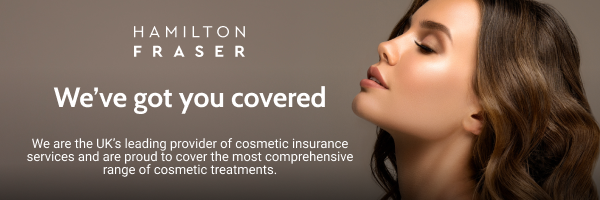
5 minute read
HAIR MANAGEMENT SPECIAL | WHAT’S TRENDING
FEAR FACTOR
Survey highlights the most common fears and why some patients are shunning non-surgical aesthetics.
A new survey has revealed the reasons people are put off undergoing non-surgical aesthetic treatments, such as dermal fillers, thread lifts and wrinkle-relaxing injections. It also highlights considerable regional, age, and gender divides in aspects such as fears about looking ‘fake’, horror stories in the press and what friends, family and partners might think.
The research was conducted by independent survey company OnePoll on behalf of SafeAP (https://safeap.co.uk), a marketplace app that helps people find qualified practitioners, founded by two female NHS doctors. It surveyed 500 men and women who have considered cosmetic treatments such as non-surgical liposuction, facial peels and rejuvenating injections, but ultimately did not go ahead, on exactly what has put them off.
Highlights
Perhaps unsurprisingly, in the current climate, cost is still the number one factor in changing people’s minds about undergoing cosmetic procedures, with half (50%) citing this reason. This is closely followed by fears of possible complications (46%); looking unnatural (e.g., over-inflated lips, frozen expressions) with 41% quoting this as the cause; and ‘horror stories in the media’ at 32%.
Other highlights include:
• 28% are scared of suffering pain during the treatment
• Nearly a quarter (22%) don’t know how to find a reputable practitioner
• One in five (21%) decided they want to ‘grow old gracefully/accept their flaws’ – yet there is a considerable age discrepancy, with older people less likely to accept their fate
• One in six (16%) fear being judged by friends and family (interestingly, the older the respondent, the less likely they were to care)
• One in seven (14%) are worried their partner wouldn’t like it.
Gender Divides
There’s also a considerable gender divide in certain factors, such as the worry about complications - over half (53%) of women cite that as a concern, compared to just over a third (36%) of men. Women are also more likely to be put off by horror stories in the media, with half (49%) scared off having treatments thanks to frightening headlines. Men care considerably less, however, with just over a quarter (27%) being concerned about what they see or read in the news. However, women may be more exposed to negative stories in female-focused publications.

Genders are aligned when it comes to growing old gracefully, with equal numbers (21%) saying they are resigned to what they see in the mirror and will accept their flaws (though this changes with age!). More men than women, however, are concerned about what partners will think, with around one in six (15%) men reporting that as a factor, compared to about one in eight (13%) women.
Interestingly, more than twice the amount of men (21%) than women (9%) admit to having already had a negative experience with a cosmetic procedure.
Regional Divides
• Nearly two-thirds (63%) of people living in Northern Ireland are worried about cost, compared to just 38% in the East of England
• Over half (56%) of people living in the East of England are scared of complications
• Almost half of people (47%) in the West Midlands have been put off by horror stories in the press
• Just 13% of Scots are bothered about pain, compared to 38% in the East of England
• Scots might not be bothered about pain, but they certainly care what their partners think, with a quarter citing that as a reason for avoiding treatments
• Almost one in three (28%) people living in Yorkshire and the Humber are not sure where to start or how to find a reputable practitioner
• Growing old gracefully is a factor for 29% in the North West, but definitely not on the radar for people living in Wales, with just 9% happy to accept their beauty destiny
• No respondents in the South West of England have had a prior negative experience, while a quarter (24%) of those in the North West have suffered at the hands of an unscrupulous practitioner.

Age Gap
Unsurprisingly, the less ageing a person has experienced, the more likely they are to be resigned to their flaws, with 43% of 18-24 year-olds happy to grow old gracefully but only 18% of 55-64 year-olds saying the same.
Older folks were also less likely to fear judgment from friends and family – with one in five (21%) 18 to 24-year-olds worrying about this factor, versus only 8% of over 65-year-olds.
SafeAP also released the results of a companion survey, which polled 500 women only. The results were largely the same, although it further revealed that 80% of women in Northern Ireland are concerned that they would appear unnatural, superseding all other concerns.
Maxillofacial surgeon Sieuming Ng who, along with Dr Subha Punj, pioneered SafeAP to ensure that non-surgical aesthetic procedures are delivered by qualified healthcare professionals in a safe environment, said, “It’s always interesting to get an overview of human behaviour in times of social change, such as during the current cost-of-living crisis and a postpandemic world.
“Unsurprisingly, in this climate, cost is still the overriding factor for many people considering undergoing an aesthetic treatment. However, the survey did throw up some interesting results. For example, few over-65 year-olds cite fear of pain as an issue, compared to almost 60% of 18 to 24-year-olds. This may mean that with age comes less worry when compared to the benefits of achieving a rejuvenating look.
“Gender differences were also notable – perhaps men feel less of a societal stigma and are less fearful about possible complications or looking ‘unnatural’.”

Shutterstock/Damir Khabirov










